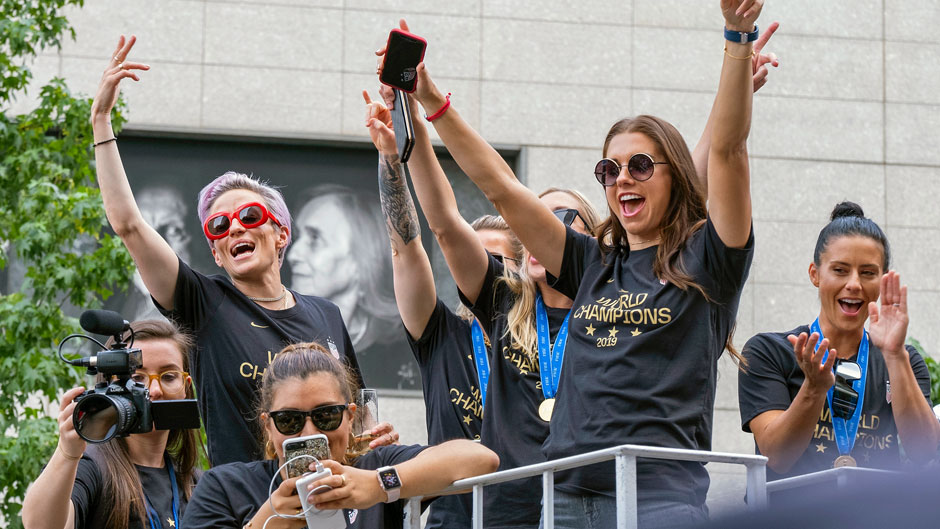This morning, 133 years after New York City held its first ticker-tape parade to welcome the Statue of Liberty, the city feted another national treasure forged in France—the winners of the FIFA Women’s World Cup, who not only brought home their second consecutive championship trophy, but changed the conversation about gender equity and equal pay for women around the world.
As Megan Rapinoe, Alex Morgan, and their teammates—who sued the U.S. Soccer Federation for “institutionalized gender discrimination” just three months before defending their 2015 title in France on Sunday—rolled through Manhattan under a blizzard of confetti, they were undoubtedly celebrating that other remarkable feat, too.
The women may not have won their lawsuit, which seeks the same pay and resources as their male counterparts, who have never won a World Cup while they’ve won four. But, according to Windy Dees, associate professor of sport administration in the School of Education and Human Development, their legal challenge already has helped them win in the court of public and corporate opinion, which is adding significant momentum to their cause.
“This championship is a real game changer, but it’s not as much about the win, which is clearly important, but about the fair-pay lawsuit, which put the issue on the table globally,” Dees said. “Four years ago, they had the same issue but no one was talking about it, and by no one I primarily mean the traditional media. Now traditional media and fans through social media are applying really heavy pressure and it’s going to force FIFA to address it. They may not even things out, but now you really feel like it’s steamrolling in the right direction.”
And that, Dees believes, is largely due to the ongoing litigation, which she said not only highlighted how disparately women soccer stars are treated, but gave them a platform to speak on behalf of women and minorities everywhere—a platform fueled in part by gender issues raised by the Me Too Movement. As she noted, the total prize for the men’s 2018 World Cup was $400 million, which prompted FIFA to double the women’s total prize pot this year—to a mere $30 million—and propose doubling it again in 2023 to $60 million, still a fraction of the men’s.
“In the past, the excuse for such disparate pay scales has been that the men’s games are more widely watched, or the men perform at a higher level, or businesses won’t invest in sponsorships, but this cup showed the fallacy of those arguments and made the women’s arguments airtight,” Dees said. “Now that people are more educated on the finances behind the sport, they realize the women are getting a pittance from FIFA. They can see the women’s games are sold out, that the ratings are extremely high, that the women are bringing in more revenue, and selling more of their official merchandise than the men.”
Indeed, even before the quarterfinal match, when the U.S. knocked France out of the competition, Nike announced that the U.S. women’s national team jersey was Nike’s best-selling, single-season soccer jersey, of men or women, of all time.
Given their success on and off the field, associate professor Tywan Martin, a colleague of Dees in the Department of Kinesiology and Sports Sciences who specializes in media and consumer behaviors, believes that the women soccer players should be paid more than their male counterparts.
“I am of the opinion that whatever money was allocated to men is not working out, and that a larger allocation should be shifted to women,” he said. “We need to make sure there are more young girls playing this sport, and we need to maintain our reputation throughout the world as being the premier training ground for girls and women in soccer.”
But even while he believes social media has helped galvanize public opinion to the soccer women’s cause, he doubts much will change until the well-entrenched, male-dominated system that has been in place for decades is dismantled. Noting that only six of the 36 members on FIFA’s council are women, he said the conversation hasn’t changed much since Brandi Chastain ripped off her shirt, exposing her sports bra, after scoring the winning penalty kick against China in the 1999 World Cup final.
“When she took off her shirt, everybody said, ‘Oh my God, this is going to change everything, and move women in sport forward.’ But 20 years later, we’re still talking about the same thing,” Martin said. “Unfortunately, this system of hierarchy that we live in continues to rewrite itself and rework itself to maintain the status quo—and that is that sport is male-dominated. You can throw a ton of money at it, but until that system is uprooted we’re going to get the same result, which is slower change.”

